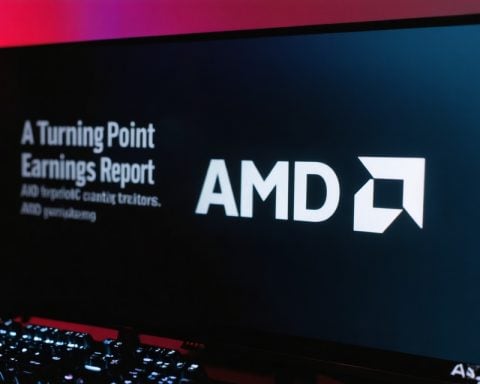- Upstart Holdings’ stock price rose nearly 200% in a year, underscoring the impact of AI in credit assessments.
- The company reported a 56% revenue increase and a 68% rise in transaction volume, benefited by economic stability and advanced AI algorithms.
- Upstart’s performance is heavily influenced by interest rate fluctuations, a significant risk factor.
- The company relies on a few key customers; losing one could substantially affect its revenue and bargaining strength.
- Despite optimism reflected in its high price-to-sales ratio, future success is not assured, especially amid economic changes.
- Investors face a choice between potential AI-driven growth and the risks posed by market volatility and high valuations.
- Upstart symbolizes a blend of technological innovation and economic challenge, making it a high-stakes option for investors.
The world of artificial intelligence continues to captivate, and nowhere is this more evident than in the soaring performance of certain AI-driven stocks. One such star is Upstart Holdings, a company revolutionizing credit assessments through AI. Within just a year, its stock price has skyrocketed nearly 200%, leaving both analysts and investors in awe. Earnings reports reveal a prolific surge: a 56% rise in revenue and a 68% leap in transaction volume, driven by economic stability and savvy AI algorithms.
But not all that glitters is gold. Despite robust financials, Upstart’s path is fraught with uncertainties. Predominantly, its fate is tied to the ebb and flow of interest rates—a factor beyond its control. A market downturn or credit crunch could spell trouble, as borrowing tightens and defaults rise.
Moreover, Upstart’s fortunes rest precariously on a few key customers. A loss of one could undermine its revenue stream and bargaining power. And while its current price-to-sales ratio suggests optimism, this high valuation hinges on flawless future performance—far from guaranteed.
What does this mean for investors? If you’re lured by the growth potential of AI, Upstart offers temptation. However, the savvy investor might pause, wary of its cyclical nature and steep valuation. For those who prize stability and long-term profitability, caution might trump bravado.
Upstart stands at the intersection of daring innovation and economic vulnerability. Is its AI prowess enough to overcome market unpredictability? That gamble lies at the heart of today’s investment discourse.
The Shocking Truth Behind Upstart Holdings’ AI Revolution: What Investors Must Know Now!
How-To Steps & Life Hacks: Investing in AI Stocks
1. Research the Company: Understand Upstart’s business model and AI technology. Look at how they use AI to improve credit assessments and customer experience.
2. Diversify Your Portfolio: Balance your investments in AI stocks like Upstart with more stable options to mitigate risk.
3. Monitor Economic Indicators: Keep an eye on interest rates and credit market conditions, as these heavily influence Upstart’s performance.
4. Stay Informed: Follow earnings reports and market analyses. Changes in Upstart’s key customer relationships or financial health could signal shifts in stock performance.
Real-World Use Cases
Upstart leverages AI to assess credit scores more accurately than traditional methods. This allows for:
– Faster loan approvals
– More personalized lending offers
– Expanding credit access to underserved demographics
Market Forecasts & Industry Trends
The AI in the financial services market is expected to grow significantly, with trends towards automation, data-driven decision-making, and personalized customer service. According to a report by MarketsandMarkets, the AI in the banking sector is projected to reach $17 billion by 2024, growing at a CAGR of 32%.
Controversies & Limitations
One controversy surrounding Upstart is its dependency on just a few large customers, which could pose a financial risk if these partnerships dissolve. Additionally, reliance on historical data in AI models might lead to biased or inaccurate credit assessments for new kinds of borrowers.
Security & Sustainability
Upstart invests in cybersecurity measures to protect sensitive customer data. The sustainability of its business model may hinge upon its ability to adapt to regulatory changes and societal expectations regarding AI ethics and consumer privacy.
Insights & Predictions
Experts predict that AI will increasingly become a standard tool in credit assessments, potentially lowering default rates and improving financial inclusion. However, this utilitarian benefit is tempered by the challenges of ensuring AI models remain unbiased and compliant with legal standards.
Pros & Cons Overview
Pros:
– Rapid growth potential with AI innovation
– Expanding market opportunities
– Improved credit risk assessment
Cons:
– Vulnerability to economic cycles
– Customer concentration risk
– High current valuation requiring sustained performance
Concluding Recommendations
For those intrigued by Upstart’s potential but wary of its risks, consider these quick tips:
– Stay Updated: Regularly check AI stock market analyses and Upstart’s performance reports.
– Balance Risk: Allocate only a portion of your investment portfolio to high-growth, high-risk stocks like Upstart.
– Know Your Risk Appetite: If you value stability over potential high returns, consider diversifying further away from cyclical stocks.
By staying informed and strategic, investors can navigate the promising yet unpredictable landscape of AI-driven financial innovations.
For more investing insights, visit the NASDAQ website.



















